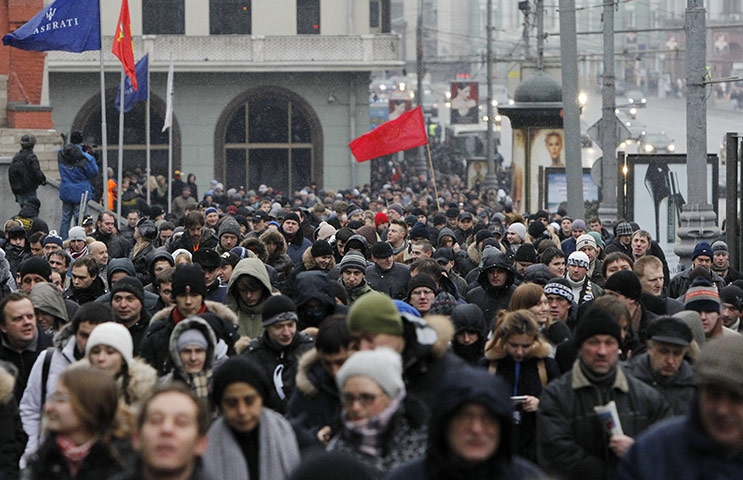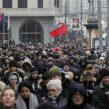
Putin is Firmly Set to Win Ugly
Publication: Eurasia Daily Monitor Volume: 9 Issue: 30
By:

There has been a perceptible change of mood in the development of the political crisis in Russia in the week that has passed since the mass rallies in Moscow – with just three weeks remaining until the presidential elections. Prime Minister Vladimir Putin has gained confidence in the fact that the rally of his supporters on the Poklonnaya Gora was more numerous than the opposition rally on the Bolotnaya square, and his staff now plans for an even grander event on February 23 (Nezavisimaya Gazeta, February 6, Moskovsky Komsomolets, February 10). Putin finds no problem in the distinctly Soviet methods of gathering the masses by instructing state organizations to organize “volunteers.” What matters is that the administrative channels work more efficiently than the social networks (Moskovsky Novosti, February 6). It is easy to see in this attitude the usual folly of all authoritarian regimes – believing in its own propaganda, but the newly-gained triumphalism is translated into a strict order to secure an overwhelming victory in the first round of the elections.
Opinion polls provide little support for such an ambition, giving Putin from around one third to below half of the vote (www.lenta.ru, February 6; www.gazeta.ru, February 10). His personal rating remains stable, but the approval of his super-centralized system of power and of his team of loyal lieutenants is in steady decline (www.levada.ru, February 9; Vedomosti, February 10). Putin’s campaign “technologists” assume that his core electorate has expanded from about one quarter to above one third of the total voting population (the turnout might exceed the usual 70 percent), because the protests have accentuated the fear of a “color revolution,” so there is little need in mobilizing this group. The opposition of various persuasions could also count on about one third of the vote, so the main task is to convince the undecided, who are not exactly thrilled with Putin’s return to the Kremlin, that they have no other choice.
Putin spares no effort working on this task, and this week he will probably travel to more regions, make new speeches and maybe even publish another article (so far there is four). This burst of activity would have been pretty normal for an aspiring candidate, but in this case, every day brings new commitments for disbursing money from the federal budget and fresh promises of political reforms. The former become less and less credible as the petro-revenues are not expanding anymore and the latter go too far for the bureaucrats and fall way too short for the critics (Vedomosti, February 10). Putin has always excelled at saying to different audiences exactly what they want to hear, but now the “have-nots” suspect him of covering up the crimes of corrupt loyalists, while entrepreneurs are rather doubtful about his idea of legitimizing the results of “dirty” privatization in the 1990s, by making a special donation or finding “other solutions” (Ekho Moskvy, February 10).
Dozens of sycophants are whispering to Putin that his victory is beyond doubt, and his own political instinct has likely become too slow after years of absolute supremacy, so he probably does not get it that only crude rigging could guarantee him the desired result in the first round (Ezhednevny Zhurnal, February 10). He may not care much about how exactly the ballot boxes would be stuffed and the protocols edited attending only to the big picture, making sure, for that matter, that Grigory Yavlinsky, who could have gained a few important percentage points, is taken off the list of candidates (The New Times, February 6). He has never been a believer in democracy, yet he is sure that manufacturing a solid result would terminate the unfortunate domestic turmoil, as it did back in 2000, and he would again emerge as the winner that takes it all. The old opposition, like the communists, wants to deny him the fullness of the victory, but the new “white ribbon” opposition insists that winning ugly means no victory at all.
The tens of thousands who filled the Bolotnaya square know that they connect with millions who are fed up with Mr. Putin and laugh at their jokes, like “Don’t rock the boat – our rat is seasick,” enjoying the new freedom from fear. They also know that these millions are not angry enough to join the protests and are generally content with their jobs and incomes. What has brought surprisingly big crowds to the streets of the affluent and arrogant in Moscow was the outrage triggered by the shameless falsification of the parliamentary elections in favor of the pro-Putin United Russia party, which has suffered such reputation damage that a “re-branding” is in order (Izvestiya, February 9). The leaders of the opposition have good reasons to expect that another blatant fraud – after all the promises of clean elections – would double the insult and increase the protests by an order of magnitude.
At this stage of the crisis, Putin assumes that he has found a way to belittle the street power of his opponents and so can dismiss off hand the demand for holding new parliamentary elections in 12-18 months. His personal nemesis, Mikhail Khodorkovsky, the most famous political prisoner in Russia, argues that this demand could gain new power after the anti-climax of the presidential elections, when Putin would have to implement promised political reforms (Novaya Gazeta, February 10). Experts go even further and argue that every symbolic step in empowering the parliament and the governors would aggravate Putin’s crisis of governance caused by the erosion of his authority (Kommersant, February 7; The New Times, February 6).
The urban middle class that has turned against Putin is indeed too thin to form a majority opinion and not angry enough to make a revolution. What Putin cannot understand is that his servile bureaucracy constitutes a part of this emerging class and gradually internalizes its opinions and preferences. Making fun of the pompous leader has become a cultural norm that also implies disobeying his loud orders. Putin plans to age gracefully in the Kremlin, but being booed out of it may actually be his best option for the finale of an inglorious reign.




